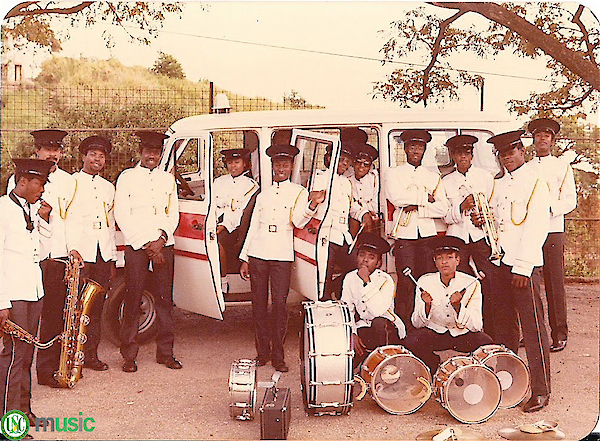History
A Brief History of Our Department...

Still of the Caribbean Union College (CUC) Marching Band 1982-1984
The development of music at what started as East Caribbean Training school, now the University of the Southern Caribbean, in August 1927 parallels the musical development at many Seventh-day Adventist tertiary level institutions worldwide. It must be remembered that the Old Testament schools of the prophets had as one of the subjects in the curriculum, sacred music. It is my conviction that this influence and practice was a significant factor in the early development at the institution. The first complement of teachers included, R.ST. Hamilton; his wife, Inez Hamilton; and Miss Linda Austin. Mrs. Hamilton provided the institution with many aspects of her educational ability which included music. She wrote many of the school songs of that early period one of which was known as the March Song, "As We March Along".
Singing was a staple of school life in those pioneer and early days. On the farm, in the kitchen and in the laundry where students worked the voices of students singing could often be heard above the din of machinery and clash of pots and pans. From a more structured point of view, music was a part of the curriculum and a requirement for graduation. While there was no formal department of music, private lessons were given in the following areas: organ (reed organ), piano, and voice. Male quartets were very popular in the 1930’s and 1940’s and these groups visited churches rendering both promotional and inspirational service.
Even though an organized Music Department was not functioning there were several faculty who were involved in music tuition and who specialized in different areas up until 1950: J. I. Crawford, choral organizations; Felicia Hills, piano; Mrs. Smith, voice; Florence Tucker, choir and voice; and Mrs. Inez Hamilton who was skilled in different areas of music. A highlight of that period was the granting of a scholarship to Clarice Salsa of Guyana to study voice at Pacific Union College. The scholarship was given in the late 40s.
There was no Queen’s Hall, [National Academy for the Performing Arts] (NAPA) or Central Bank [Auditorium] at the dawn of the institution but there was a Princess Building located in Port of Spain close to where NAPA is now located and which housed a relatively spacious concert hall. At this venue Union and Conference sessions were occasionally held. It also served as the location for performances of the choir from time to time. As I close this segment of the Music Department’s history, I must make reference to the College Heralds, a nine member male group which became the first musical group to undertake an overseas trip. Their first trip was to Barbados in 1950. Of particular interest is the fact that five of the nine members were Barbadians.
I come now to what I consider the watershed of the Music Department: the arrival of Mrs. Frances Burke-Archbold who became the Head of the Department in 1949/50. Mrs. Archbold, a Jamaican, was a Licentiate of the Royal School of Music with an emphasis in Performance. Perhaps the most significant introduction was the preparing of students for the external examination of the Royal Schools of Music in both Piano and Theory of Music. The first students were entered in 1950/51 respectively. Three of the advanced students at the time were Marjorie Greaves, Leola Weithers and Verna Reid. Just a few years later Myrna Belgrave who started lessons with Mrs. Archbold blossomed into a fine pianist an became Mrs Archbold’s assistant. The foundation laid by Mrs. Archbold was to become the base on which others built and expanded to become what is now the vibrant Music Department of the University of the Southern Caribbean.
Before moving to the next phase of musical development it is prudent to mention the names of faculty members who though not music faculty in the strictest sense lent of their musical ability and interest and made significant contributions to music at the institution. The gamut covers the stretch from the 50s to turn of the twenty-first century.
-
Olive Edwards: Outstanding soprano soloist and excellent choral conductor. She also held position of Dean of Women, Registrar, Mathematic and English teacher.
-
Lucy May Kum: Choral conductor whose substantive academic discipline was Business and who also functioned as Dean of Women.
-
Linda Austin: The legendary faculty member of forty years service during which time she lent her musical interest as a faithful choir member.
-
C. J. Quashie: A faculty member with strong, interest in developing a band and succeeded with a fair degree of success. His substantive position was Dean of Men.
-
Vernon Roach: A household name on the campus. He was well known in the general Trinidad community and in many churches on the Island. Roach had an instrumental ensemble which was built around the members of his musically gifted family, on campus personnel and persons from surrounding churches. The band often provided the march music for graduation exercises.
-
Dennis Kadan: A young skilled keyboardist on both the piano and the organ. He also led the choir quite successfully at the Trinidad and Tobago Music Festival.
-
Cynthia Ward: An enthusiastic and faithfully supportive member of musical ensembles while dutifully functioning in the Department of Business.
